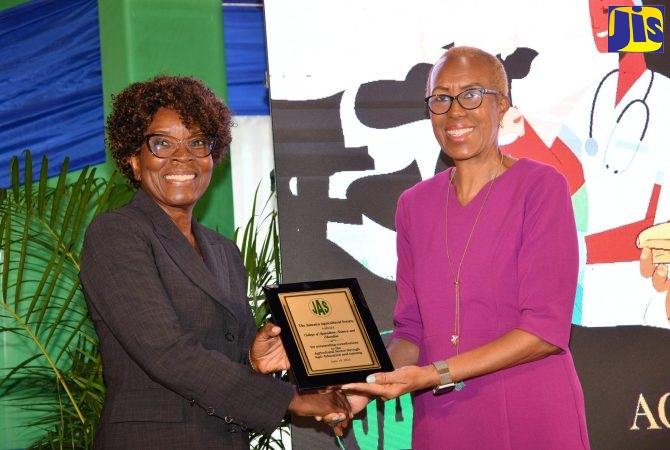Schools establishing gardens throughout the 2022/23 academic year are being encouraged to forge partnerships to sustain these over the summer.
This urging comes from Minister of Education and Youth, Hon. Fayval Williams, who said schools should look to partner with community members, parents, and groundsmen at institutions to help to sustain their gardens, “so that when they come back in September, they don’t look at it and [say], ‘it’s brown instead of green the way [we] left it’.”
She was speaking during the Jamaica Agricultural Society (JAS) ‘Women in Agriculture’ conference at the Terra Nova All-Suite Hotel in Kingston on Wednesday (June 14).
The event saw 20 women being awarded for outstanding contributions to agricultural education.
Mrs. Williams told the awardees: “For us, in our schools, like our primary schools or high schools, we’d love to hear from you, women in agriculture, as to how we can sustain the school gardens; it is a real issue, especially when schools go on summer break.”
The school garden initiative is heavily promoted by the Government, with the latest national effort executed on Labour Day, when the Ministry of Agriculture, Fisheries and Mining, through its agencies, assisted in the establishment of gardens at several schools.
Meanwhile, four agricultural training institutions were also recognised during Wednesday’s event.
These were the College of Agriculture, Science and Education (CASE); Dinthill Technical High School; Knockalva Polytechnic College, and HEART/NSTA Trust.
“Over many decades, education training institutions in Jamaica have provided opportunities for women to hone their skills in agricultural science, and many of our public schools have, as part of the curriculum, a component aimed at encouraging all of our students to appreciate the importance of agriculture to our economic and social lives,” the Minister said.
She informed that in 2022, a slate of interesting courses was offered by CASE. They included those that explored integrating geospatial tools in food security, education and research, targeted research and extension interventions for enhanced goat production in Jamaica, and agro-processing.
Additionally, the institution developed a mobile pineapple processing lab and partnered with several schools in the United States to expose students to different segments of the agricultural sector.
“Academic institutions and agricultural instructors have a critical role to play in empowering women in agriculture. By providing education, training, support and advocacy, they can help women succeed in this field and contribute to the growth and development of our country,” Minister Williams said.


